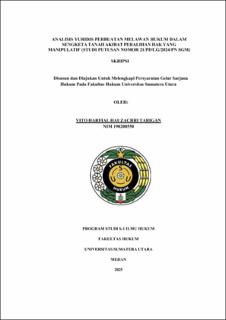Analisis Yuridis Perbuatan Melawan Hukum dalam Sengketa Tanah Akibat Peralihan Hak yang Manipulatif (Studi Putusan Nomor 21/PDT.G/2024/PN SGM)
Legal Analysis of Lawbreaking in Land Disputes Due to Manipulative Transfer of Rights (Study of Decision Number 21/PDT.G/2024/PN SGM)

Date
2025Author
Tarigan, Vito Harfial Hauzachri
Advisor(s)
Maria
Sembiring, Idha Aprilyana
Metadata
Show full item recordAbstract
Land has an important role in human life. The increase in population that is not proportional to land availability causes high demand and becomes a trigger for various disputes. Land disputes generally occur due to the transfer of rights that does not comply with legal provisions. In practice, unlawful acts often occur, as seen in Decision Number 21/Pdt.G/2024/PN Sgm, where a manipulative transfer of land rights took place without the knowledge of the rightful party. Based on this issue, this study formulates three main problems: (1) how unlawful acts in the manipulative transfer of land rights are regulated under Indonesian positive law;
(2) what are the legal consequences of the manipulative transfer of land ownership rights; and (3) how the Panel of Judges considered the law in Decision Number 21/Pdt.G/2024/PN Sgm regarding the land dispute caused by a manipulative transfer of rights. This study aims to analyze the legal regulation of unlawful acts in land disputes due to manipulative transfers of rights, understand the legal consequences, and analyze the legal reasoning of the Panel of Judges in that decision. This study uses a normative juridical method with statutory and case approaches. The data used is secondary data collected through literature studies and analyzed qualitatively. The research shows that land rights are regulated in the Basic Agrarian Law (UUPA) Number 5 of 1960, which can only be held by legal subjects, and are born and expire according to the applicable law. The land ownership certificate functions as strong evidence of ownership based on Article 19 paragraph (2) letter c of the UUPA and Government Regulation Number 24 of 1997. However, in practice, manipulative transfers often occur through forged documents or transfers without a deed from the Land Deed Official (PPAT), which are classified as unlawful acts under Article 1365 of the Civil Code (KUHPerdata). Such acts result in legal consequences in the form of changes in ownership status and legal relations as well as legal consequences in the form of obligations to provide compensation. The state provides legal protection through the land registration system, the formation of the Anti-Land Mafia Task Force, and dispute resolution through the National Land Agency (BPN) and the Administrative Court (PTUN). In Decision Number 21/Pdt.G/2024/PN Sgm, the Panel of Judges stated that the transfer of rights without the consent of the lawful owner and not fulfilling the valid conditions of an agreement under Article 1320 of the Civil Code constitutes an unlawful act, and ordered the return of the land rights to the plaintiff, reflecting the fair application of law and ensuring legal certainty.
Collections
- Undergraduate Theses [3142]
